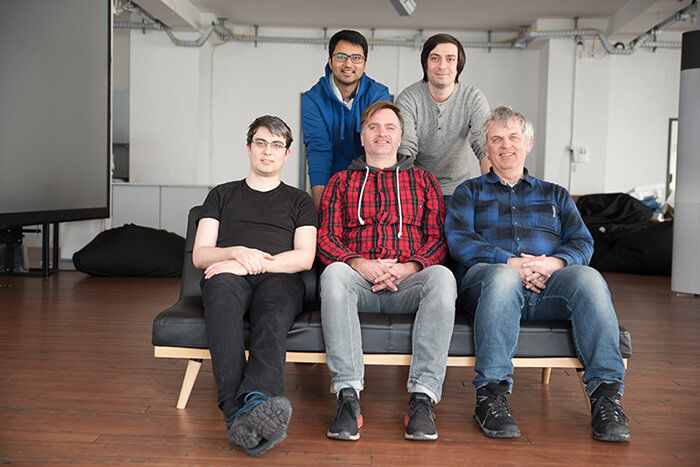3D Photography with Standard Cameras: Start-up develops special lens for photography and film

The K-Lens team: Pascal Bies, Sunil Jaiswal, Matthias Schmitz, Zaur Aliev, Klaus Illgner (from left to right)
Until now, photographers and filmmakers had to use special equipment if they wanted to change the focus area in post-processing or reproduce an object three-dimensionally. The start-up K-Lens has now developed a special lens that can turn any standard camera into a 3D camera. What began as a research project of the Max Planck Institute for Informatics and Saarland University, and was developed further with the help of the IT Inkubator, is expected to become available as a commercial product starting in 2019.
Previously, the capture of depth information was only possible using images or footage from camera arrays or special light field cameras. Along with the two image dimensions, these also record the direction of incident light rays. However, photographers and filmmakers had to pay for the advantages – such as extended depth of field, adjustment of focus or blur in post-processing, depth-based segmentation and 3D images – with high acquisition costs and cumbersome work flows. The Saarbrücken start-up K-Lens now developed a special lens of the same name, which was based on a research project of the Max Planck Institute for Informatics and Saarland University and now allows every photographer to benefit from the advantages of 3D technology using their existing equipment. “The innovation of our lens is that it’s compatible with today’s technical standards and can, therefore, be used with any camera,” explains Matthias Schmitz, founder, and CEO. So far, there is no lens on the camera market that can match the possibilities of the K-Lens. It offers not only complete control over focus and blur, fully automatic segmentation, depth-based segmentation, perspective change and 3D images, but also complete access to the depth planes of the recorded image.
“Photos don´t have to end up in the digital recycling bin because of focusing errors, a common problem, for example, in macro photography. Image series, as in product photography, can be shot quicker and image objects can be segmented faster,” explains Klaus Illgner. The CTO and enthusiastic amateur photographer is responsible for technical development at K-Lens. New effects, like focus and blur within the same image plane, can also be realized with the K-Lens. The start-up company will also supply the software for achieving these post-processing effects.
The product is expected to have a length of 20cm and a maximum weight of 800g, similar to standard hand-held zoom lenses. Its core component is the so-called “Image Multiplier,” a system of mirrors that, like a kaleidoscope, produces different perspectives of the same scene, which are then simultaneously projected onto the camera sensor. Software developed by K-Lens then generates the light field image.
Worldwide patent protection has been applied for. After approval in the USA, Matthias Schmitz and his four other colleagues expect to receive the patent approval for the other markets still this year. Following two years of development work in the IT Inkubator, an institution of Saarland University and Max Planck Innovation, the five-person team has been funded since October 2017 by the venture capital firm Saarländische Wagnisfinanzierungsgesellschaft mbH (SWG). Doris Woll, managing director of the SWG, is pleased to be involved in the foundation of another innovative company in the Saarland and that the market entry of the K-Lens technology will take place from the same place where it was initially developed. “New, demanding and attractive jobs will be created here in an innovative technological setting,” says Doris Woll. “This is the objective on all investments that are supported by SWG.” At the same time, K-Lens is taking part in a research project developing a commercial light field camera for the professional film industry. The project, supported by the Federal Ministry of Education and Research (BMBF), has a project volume of 2.7 million Euro. “In the long term, we would be interested in strategic cooperation with a market leader like Sony, Nikon, or Canon, to learn from their production know-how and their international sales and service models,” explains Matthias Schmitz. The founders want to present a prototype of the first purely photographically designed K-Lens still this year.
The qualified lawyer and graduate in business administration Matthias Schmitz can look back on 15 years of professional experience, mainly in management consulting at PricewaterhouseCoopers, and is now responsible for business development at K-Lens. Dr. Klaus Illgner is responsible for technical development. He has a Ph.D. in engineering and extensive professional experience in image and video technology, with positions at Texas Instruments, Siemens as well as in the audivisual media engineering at IRT GmbH.
Questions can be directed to:
Matthias Schmitz
K-Lens GmbH
Ufergasse 2
66111 Saarbrücken
Tel: +49 176 84 31 42 76
E-mail: matthias.schmitz@k-lens.de
Hristo Pentchev
IT Inkubator GmbH
Saarland Informatics Campus A1.1
66123 Saarbrücken
Tel. +49 681 302 64273
E-mail: hristo.pentchev@it-inkubator.de
Andreas Wehr
Saarländische Wagnisfinanzierungsgesellschaft mbH
Franz-Josef-Röder-Straße 17
D-66119 Saarbrücken
+49 681 3033 132
E-mail: Wehr@swgmbh.de
Editor:
Gordon Bolduan
Competence Center Computer Science Saarland
Saarland Informatics Campus E1.7
66123 Saarbrücken
Tel: +49 681 302 70741
E-mail: gbolduan@mmci.uni-saarland.de
Die Öffentlichkeitsarbeit am Saarland Informatics Campus wird unterstützt durch das Kompetenzzentrum Informatik Saarland, gefördert aus Mitteln des Europäischen Fonds für regionale Entwicklung (EFRE) und Mitteln der Staatskanzlei Saarland.



